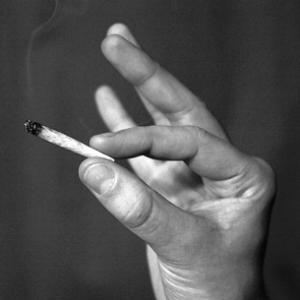This article was produced in collaboration with AlterNet and first appeared here.

The move comes as at least three other Indian tribes that have embarked on marijuana operations after the Justice Department seemingly gave them a green light last year have been raided by the DEA, a Justice Department agency. At this point, Indian tribes have reason to be nervous about what the federal stance really is.
But the Flandreau pot operation also drew fast and intense opposition from the state's Republican political establishment and law enforcement figures. And that opposition has brought renewed attention to one of the most bizarre state marijuana laws in the land, South Dakota's "internal possession" law.
As Republican state Attorney General Marty Jackley warned -- twice -- when the tribe announced its plans in June, "South Dakota law prohibits the internal and physical possession, distribution, and manufacture of marijuana by: (1) all non-Indian persons anywhere in South Dakota including within Indian country; (2) all persons, including tribal members, outside of Indian Country."
The sheriff and prosecutor of Moody County, where the Flandreau reservation is located, reiterated Jackley's point.
"Bottom line," said Sheriff Troy Wellman, "if you're non-native, it's illegal for you to have marijuana in your system, regardless of whether you're on tribal ground."
"If you are a non-tribal member that goes over onto that property and ingests marijuana in any form, you are breaking the laws in the state of South Dakota," Moody County State's Attorney Paul Lewis added.

Someone who legally smokes marijuana in Colorado and then drives across the prairie to South Dakota can be charged with the crime of having smoked marijuana elsewhere. It's the same for medical marijuana patients in states bordering South Dakota. Someone who holds a Minnesota or Montana medical marijuana card, uses his medicine, and then travels to South Dakota can be charged with the crime of having medicated where it is legal.
Here is the law:
22-42-15. Ingesting substance, except alcoholic beverages, for the purpose of becoming intoxicated as misdemeanor--Venue for violation. Any person who intentionally ingests, inhales, or otherwise takes into the body any substance, except alcoholic beverages as defined in § 35-1-1, for purposes of becoming intoxicated, unless such substance is prescribed by a practitioner of the medical arts lawfully practicing within the scope of the practitioner's practice, is guilty of a Class 1 misdemeanor. The venue for a violation of this section exists in either the jurisdiction in which the substance was ingested, inhaled, or otherwise taken into the body or the jurisdiction in which the substance was detected in the body of the accused.
A Class 1 misdemeanor in South Dakota is punishable by up to a year in jail and/or a $2,000 fine. That's the same penalty as for simple marijuana possession.
Note that the law specifically allows for prosecuting people for internal possession either where they ingested the substance or where it was detected.
It's not that the cops in South Dakota are randomly accosting passersby and demanding they submit to drug tests -- probable cause is needed -- but what typically happens is that someone is arrested and police then intimidate him into consenting to a urine drug test during booking. The person is then hit with another criminal charge -- internal possession -- providing more leverage for prosecutors during plea negotiations.
"The cops took me downtown and said if I didn't piss for them, they'd stick something in my dick and take it by force," Huron resident Dave Johnson said of his 2003 internal possession bust. "They were going to take it forcefully -- that's what they told me. So I said okay."
That's still how it works. People being booked into jails are told they need to provide a urine test, and if they demur, they are threatened with a court order and the prospect of forced drug testing. Of course, consenting to such drug tests makes it impossible for defense attorneys to challenge them in court, but agreeing to be tested means not only is the prospect of a forced drug test avoided, but also that the defendant will likely be booked and released instead of being held until he can appear before a judge for a warrant hearing.

While South Dakota residents are the most frequent victims of the state's internal possession law, it could happen to anyone, especially visitors unaware of the law. And they don't even have to get arrested for something to face a possible prosecution. Imagine you're a medical marijuana patient visiting Rapid City for a shopping trip and your car gets T-boned by a drunk driver who runs a red light. Hospitals routinely test the blood of accident victims. Congratulations, you've just become a criminal.
South Dakota, where you can get busted for something you did legally elsewhere. Probably not a slogan the state tourism board is going to select anytime soon.
Comments
I try never to leave Colorado!
Personally, as a stoner, I don't feel safe anywhere else!
...but if I do, I'll be sure to avoid South Dakota! But as always the real lesson is "legalize it," or even more fundamentally, "no more drug war!" And as a recovering alcoholic, I recognize the legal provision "except for alcohol" as a death-sentence for some anonymous budding young alcoholics in South Dakota, who will be given an alcohol-or-nothing choice of recreational drugs; it will be an uphill climb for these poor souls to beat the odds. They may never know that alcohol doesn't have to be the standard-bearer for social activity, and that it is okay to not-drink, just as it is okay to take a toke! Well, in Colorado, you have a choice. I choose cannabis! Woo-hoo!
In reply to I try never to leave Colorado! by Mark Mitcham (not verified)
Oh yeah, and fuck the DEA
...for being the biggest bullies possible! For the love of god, leave the tribes alone already!
End the DEA
medical case
If you're a medical marijuana patient, then you're not ingesting it for the purpose of becoming intoxicated, and it was prescribed by a practitioner of the medical arts, so this law wouldn't apply in such cases.
Add new comment